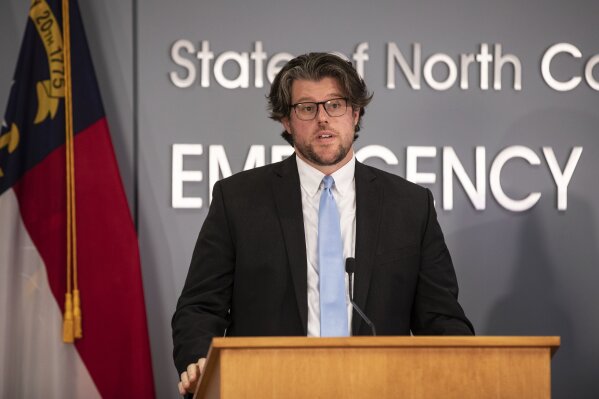A North Carolina budget is a month late, but Republicans say they are closing in on a deal
RALEIGH, N.C. (AP) — North Carolina Republicans say they are closing in on a state budget deal, with top House and Senate leaders acknowledging an income tax agreement has been reached that would lower rates on individuals more deeply than current law directs.
House Speaker Tim Moore and Senate leader Phil Berger said that a tax deal and other unnamed key differences have been worked out after fruitful negotiations late last week.
“Legislative leaders have made significant progress on the state budget,” Berger said in a tweet. Raises for state employees and teachers also had been agreed upon, they said.
Moore said the two planned to meet later Monday as well to attempt to resolve other outstanding differences, with the hope of mid-August votes on a final two-year spending plan that was supposed to start July 1. A budget’s enactment usually also signals completion of legislature’s chief annual work session.
 Roller coaster with big crack has a second structural issue, inspectors say
Roller coaster with big crack has a second structural issue, inspectors say
 With affirmative action out, North Carolina’s flagship school bars use of race, sex in admissions
With affirmative action out, North Carolina’s flagship school bars use of race, sex in admissions
 Medicaid expansion in North Carolina will begin Oct. 1, if lawmakers can soon enact a budget
Medicaid expansion in North Carolina will begin Oct. 1, if lawmakers can soon enact a budget
Taxes and salaries historically “are the kinds of things that have kept general assemblies here late,” Moore told reporters. “So the fact that some of those tougher issues have been worked out bodes well for I would say a more robust schedule” starting next week.
Moore declined on Monday to provide details on the tax changes, except that the incremental downward trajectory of the individual income tax rate in state law would fall below the end point of 3.99% currently set for 2027. This year’s rate is 4.75%.
The Senate version of the budget it passed had sought to accelerate the rate reduction over time to 2.49% by 2030. The House proposal would have been more cautious on tax cuts. Moore didn’t say what the end point would be now but that the tax provisions would contain language allowing some deeper rate cuts only if the state reaches certain revenue thresholds.
Moore said “having appropriate safeguards in place through the form of triggers” would ensure that lower tax rates don’t cause revenue shortfalls.
Democratic Gov. Roy Cooper’s administration has warned that deeper tax reductions beyond what is already in the books could siphon several billion dollars in additional revenues annually in the years ahead, threatening the state’s ability to adequately pay for education.
Cooper will be asked to sign any final budget into law. Republicans seat margins are large enough now so that they could override any Cooper veto if all GOP lawmakers are present. Many Democrats also voted for the competing House and Senate versions of the budget approved in the spring, however.
Neither Berger nor Moore have also released salary increase details. The Senate proposal in the spring offered less generous pay raises for workers and teachers than what their House counterparts offered.
Moore said outstanding budget differences between the chambers include items such as the distribution of water and sewer grants and infrastructure funds to help with economic development projects.
The two chambers also have decided on an amount to fund a nonprofit organization that would seek to turn research produced at University of North Carolina system campuses into commercial successes, particularly in rural areas. The amount is less than the $1.4 billion that the Senate sought, according to Moore.
There is also currently no language in the consensus budget or in any other separately reached agreement that would authorize potentially up to four casinos and video lottery machines statewide, Moore said.
Legislators have been talking quietly for months about the casino expansion as a way to counter gambling centers opening just over North Carolina state lines, such as in southern Virginia. Moore said any casino or video machine arrangement would need formal support from his chamber’s GOP caucus to advance.
Lawmakers have been largely away from the Legislative Building during July while budget negotiations slowed — giving Democrats fodder to blame the GOP for the delays.
Moore said that recorded floor votes were still expected next week and could include override attempts on several outstanding Cooper vetoes even if a final budget isn’t ready.
Disclaimer: The copyright of this article belongs to the original author. Reposting this article is solely for the purpose of information dissemination and does not constitute any investment advice. If there is any infringement, please contact us immediately. We will make corrections or deletions as necessary. Thank you.






